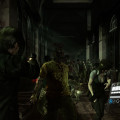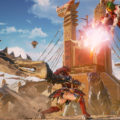Cognition Dissemination: Monster Hunter: World is a Success. But What’s Next?
In terms of game development, Capcom has been cruising along without taking many risks in the last few years. This strategy mostly hasn’t paid off, as their sales haven’t seen much improvement. But “many” isn’t synonymous with “any,” as it was gutsy of them to make Resident Evil 7 with a first-person view, a camera angle many gaming types associate with lower-budget indie games when used for the horror genre instead of big-budget AAA games. It didn’t meet sales expectations, but Capcom was still impressed with its sales.
But they took an even bigger risk with Monster Hunter: World. Until this point, Monster Hunter games were primarily made for the Japanese audience, where each game since Monster Hunter Portable 2nd G on PSP (Monster Hunter Freedom Unite in the west) sold millions upon release. It’s why they’ve mostly been on portable platforms, since Japanese players like to play their sessions in person, a luxury they’re afforded when many of them live on a close-knit island.
World was borne of Capcom’s desire to spread the franchise to the world in a form they’d find most palatable: On current-generation platforms with modern technology. This was also a gamble because the MH games tend to be esoteric in terms of how battles and the control system works, since it doesn’t play like the average action game. Battles can take a while to finish, as each battle with a gigantic beast feels like a long-though-well-paced boss battle. World simplifies the controls and includes several additions to make it easier to play, but it still requires a learning curve.
Fortunately for Capcom and the dedicated MH fanbase, the game was a success. Shortly after it released on January 26th, Capcom put out a press release confirming it’s already shipped five million copies worldwide. There’s always been a vocal audience that’s wanted a new game made for a console, ever since Monster Hunter 3/tri was moved to Wii after being originally planned for PS3. This means that audience was indeed large enough for Capcom to cater an installment towards, and it will set the franchise on a new path. Japan’s gaming audience is slowly dwindling as its population ages, and the 3DS games sold less than the PSP titles, so it’s good for them to establish a base for the series outside the country.
They were also did this without sacrificing the franchise’s whimsical identity, even though World is more story-driven than previous installments. The themes in games don’t need to be dark and edgy for the western world to take them seriously, unlike what other execs have thought in the past.
So, what’s next for the franchise and Capcom? Beyond some DLC and the Steam release coming later in the year, there are multiple directions they could venture in with the franchise. There’s no way they won’t make another console installment in the near future, but they’ll have to keep their handheld base satisfied too, which his mostly in Japan. There aren’t any real dedicated handhelds anymore, since Switch is a hybrid and 3DS is on the way out, but I expect one to be made for Nintendo’s current platform. Monster Hunter XX Nintendo Switch Ver. released for the system last year, a port of 3DS game Monster Hunter XX, and they could follow that up with a new game adjusted for those who like more compact experiences.
There’s another certainty: Where Monster Hunter goes, many inspirations will follow. (I could have used “clones” there, but that would do a disservice to titles that have inserted some original elements to distinguish it from the title that started the hunting game trend.) This happened on PSP after MHP2ndG was a success in Japan, and led to other companies making their own take on the hunting formula like Bandai Namco with God Eater and Koei Tecmo with Toukiden. But there was an interesting split during the last portable generation when Monster Hunter went to 3DS while the inspirations went to PlayStation Vita, though this worked out well for most parties involved. Expect those to start coming to consoles now.
In fact, there’s evidence suggesting this is already starting to happen. To be fair to Bandai Namco, they announced God Eater 3 for PlayStation 4, Xbox One, and PC before World released, which they claimed will be aimed towards the worldwide market. Given the state it was shown in when it was revealed in October, the game was in development before World was announced at E3 last year. Capcom’s game simply beat them to the punch.
But other franchises should follow. While the first two Toukiden games were released on PS4, the first came as a port of a handheld game, while concessions were made to the second game so it would also play well on Vita despite the improvements made to the presentation. Don’t be surprised if, say, Square Enix revives the Lord of Arcana/Apocalypse series, or if another Ragnarok Odyssey title comes along.
With World doing well (and RE7, really), this should show Capcom that taking risks is still worth it. The company has been off-kilter for a while, but it’s possible this could be the start of the company getting themselves back together — their fighting game efforts aside. They also impressed Mega Man fans by actually announcing a new game for its anniversary. I’m not confident enough to say “Capcom is back” yet, but they’re in a better position now compared to the last few years, and Monster Hunter will be their biggest guide going forward.









